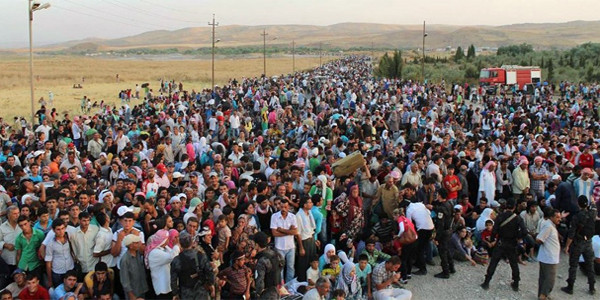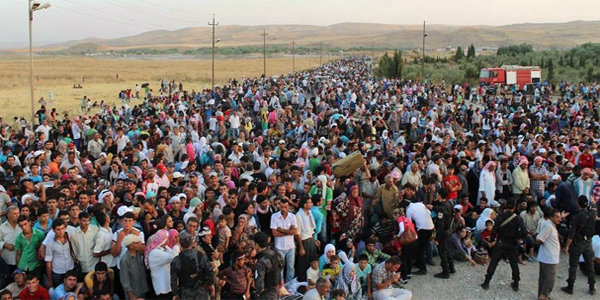 The conversation on allowing or not allowing Syrian refugees into the U.S. reached fever pitch in mid-late November and early December of last year, after the shocking attacks in Paris which took 130 innocent lives. The attacks in Brussels, Belgium on March 22 only intensified the conversation and put it as a focal point in the Presidential election. President Obama said that he would allow 10,000 Syrian refugees into the United States. In his Thanksgiving address President Obama stated: “Nearly four centuries after the Mayflower set sail, the world is still full of pilgrims – men and women who want nothing more than the chance for a safer, better future for themselves and their families.” The move was met with powerful opposition, with 32 governors stating that they will not take in Syrian refugees due to security concerns. As the Political Insider said, “These Syrian refugees are undocumented, and there’s no way to separate those who truly need help from those affiliated with the Islamic State (ISIS).”
The conversation on allowing or not allowing Syrian refugees into the U.S. reached fever pitch in mid-late November and early December of last year, after the shocking attacks in Paris which took 130 innocent lives. The attacks in Brussels, Belgium on March 22 only intensified the conversation and put it as a focal point in the Presidential election. President Obama said that he would allow 10,000 Syrian refugees into the United States. In his Thanksgiving address President Obama stated: “Nearly four centuries after the Mayflower set sail, the world is still full of pilgrims – men and women who want nothing more than the chance for a safer, better future for themselves and their families.” The move was met with powerful opposition, with 32 governors stating that they will not take in Syrian refugees due to security concerns. As the Political Insider said, “These Syrian refugees are undocumented, and there’s no way to separate those who truly need help from those affiliated with the Islamic State (ISIS).”
The issue is between those that believe we should let in refugees and those who believe the vetting process is not robust enough to make sure the refugees who enter the country are not radicalized or sympathetic towards ISIS. Many are concerned that the vetting process, as is, will not be able to adequately handle the 10,000 refugees President Obama pledged to let in. Others argue that the vetting process is long enough to make sure that those who are coming into the U.S. are those in need, stating “As you might imagine, all of the vettings, from interviews to fingerprinting, takes a while. On average, officials say it’s 18 to 24 months before a refugee is approved for admission to the U.S.” Max J. Rosenthal of Mother Jones posted in his article a quote from Matthew Soerens stating, “Those who come to the United States have gone through a very thorough vetting process…with various departments of the government—the FBI, the National Counterterrorism Center,” he says. “So these are not just random people showing up who we don’t know who they are.” The vendetta is in order to keep Americans safe and government officials (both state and federal) informed of who is residing in this country state officials should have complete access to the vetting record of refugees living in their states.
Some 32 states introduced proposals to ban refugees from settling in their states but because entry to the U.S. is a federal issue the states had no standing. However, while states cannot ban anyone they can certainly make the process difficult. According to an article by Ariane de Vogue, CNN Supreme Court reporter, she quoted American University law professor Stephen I. Vladeck saying, “Legally, states have no authority to do anything because the question of who should be allowed in this country is one that the Constitution commits to the federal government.” He continues, noting that “without a state’s participation the federal government would have a much more difficult time. “So a state can’t say it is legally objecting, but it can refuse to cooperate, which makes thing much more difficult.” The other major aspect, the policy of vetting, is also a major aspect of the refugee situation. The process includes “the State Department, the FBI’s Terrorist Screening Center, the Department of Defense and the Department of Homeland Security. A DHS officer conducts in-person interviews with every applicant. Biometric information such as fingerprints are collected and matched against criminal databases. Biographical information such as past visa applications are scrutinized to ensure the applicant’s story coheres.” The process has a “just over 50%” passage rate. It is important to assess how to protect American citizens while extending a helping hand to those who are truly in need.
There was a case in Louisiana in early November of last year, in which a Syrian refugee went missing. Then Governor Bobby Jindal wrote in a letter to President Obama stating; “As with former immigration crises and federal relocation policy, Louisiana has been kept in the dark about those seeking refuge in the state. It is irresponsible and severely disconcerting to place individuals, who may have ties to ISIS, in a state without the state’s knowledge or involvement.” He continued, “As Governor of Louisiana, I demand information about the Syrian refugees being placed in Louisiana in hopes that the night of horror in Paris is not duplicated here.” He then proceeded to “demand to know the level of background screening conducted on the Syrian refugees,” which does not seem to be information that states have access to. To protect American citizens, as well as those refugees who truly do need shelter from their war-torn country, we need to take steps to ensure we know who we let in.
For states to protect citizens and prevent future terrorist attacks as much as humanly is possible there should be a law introduced that ensures every refugee’s vetting record is available to states when requested for by officials. With the widespread concern of fake passports after “five Syrians trying to make their way to the United States using stolen Greek passports were arrested in Honduras,” allowing states access to vetted records of the refugees living in their state will allow for:
- The State’s law enforcement and social welfare agencies to not only keep track of but also assist those in need.
- Take some pressure off federal security forces and allow states to play a more active role in counter-terrorism measures, as well as be able to keep a closer eye on those suspected of extremism.
By allowing this information to be given to States, we can add an additional step to protecting the American people without sacrificing those fleeing the war in Syria the help they undeniably need.
Take Action: Sign this petition to either support Syrian refugee resettlement in the United States or to stop refugees from coming into America.




